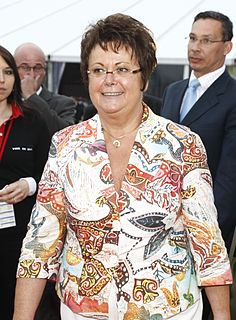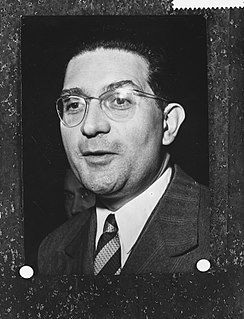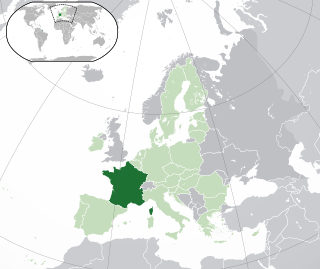Related Research Articles

François Maurice Adrien Marie Mitterrand was a French statesman who served as President of France from 1981 to 1995, the longest time in office in the history of France. As First Secretary of the Socialist Party, he was the first left-wing politician to assume the presidency under the Fifth Republic.

Seine-Saint-Denis is a French department located in the Île-de-France region and in the Grand Paris. Locally, it is often referred to colloquially as quatre-vingt treize or neuf trois, after its official administrative number, 93.

The National Assembly is the lower house of the bicameral French Parliament under the Fifth Republic, the upper house being the Senate. The National Assembly's legislators are known as députés (French pronunciation: [depyˈte], the derived translation Deputy is one of the terms for legislators in many parliamentary systems.

Christine Boutin is a French former politician leading the small French Christian Democratic Party. She served as a member of the French National Assembly representing Yvelines, from 1986 until 2007, when she was appointed Minister of Housing and Urban Development by President Nicolas Sarkozy. She was a candidate in the 2002 French presidential election, in which she scored 1.19% on the first round of balloting.

Abortion in France is legal on demand up to 12 weeks after conception. Abortions at later stages of pregnancy are allowed if two physicians certify that the abortion will be done to prevent grave permanent injury to the physical or mental health of the pregnant woman; a risk to the life of the pregnant woman; or that the child will suffer from a particularly severe illness recognized as incurable. The abortion law was liberalized by the Veil Law in 1975.
Raymond Marcellin was a French politician.

Jacques Soustelle was an important and early figure of the Free French Forces, an anthropologist specializing in Pre-Columbian civilizations, and vice-director of the Musée de l'Homme in Paris in 1939. Governor General of Algeria, he helped the rise of Charles de Gaulle to the presidency of the Fifth Republic, but broke with De Gaulle over Algerian independence, joined the OAS in their efforts to overthrow De Gaulle and lived in exile between 1961 and 1968. On returning to France he resumed political and academic activity and was elected to the Académie française in 1983.
Capital punishment in France is banned by Article 66-1 of the Constitution of the French Republic, voted as a constitutional amendment by the Congress of the French Parliament on 19 February 2007 and simply stating "No one can be sentenced to the death penalty". The death penalty was already declared illegal on 9 October 1981 when President François Mitterrand signed a law prohibiting the judicial system from using it and commuting the sentences of the six people on death row to life imprisonment. The last execution took place by guillotine, being the main legal method since the French Revolution; Hamida Djandoubi, a Tunisian citizen convicted of torture and murder on French soil, who was put to death in September 1977 in Marseille.
Souleiman Miyir Ali is a Djiboutian politician and a member of the Pan-African Parliament from Djibouti.

Lesbian, gay, bisexual, transgender (LGBT) rights in France have been seen as traditionally liberal. Although same-sex sexual activity was a capital crime that often resulted in the death penalty during the Ancien Régime, all sodomy laws were repealed in 1791 during the French Revolution. However, a lesser-known indecent exposure law that often targeted LGBT people was introduced in 1960 before being repealed twenty years later.

Amadou Lamine-Guèye was a Senegalese politician who became leader of the Parti Sénégalais de l'Action Socialiste. In 1945 he and his associate, Léopold Sédar Senghor, were elected to represent Senegal in the French National Assembly. Gueye was also elected to the French Senate in 1958. He gave his name to the 1946 Lamine Guèye law which granted French citizenship to all inhabitants of France's overseas colonies.
Feminism in France is the history of feminist thought and movements in France. Feminism in France can be roughly divided into three waves: First-wave feminism from the French Revolution through the Third Republic which was concerned chiefly with suffrage and civic rights for women. Significant contributions came from revolutionary movements of the French Revolution of 1848 and Paris Commune, culminating in 1944 when women gained the right to vote.

The 6th constituency of Puy-de-Dôme was a French legislative constituency in the Puy-de-Dôme département in the Auvergne region of France. It was eliminated in the 2010 Redistricting of French Legislative Constituencies.

In France, the French constitution of 4 October 1958 was revised many times in its early years. Changes in this fundamental law have become more frequent since the 1990s. This has had two major causes: the desire to modernize public institutions on one hand, and adapting to the European Union and to international law on the other.

Lucien Neuwirth was a French politician first elected to the French National Assembly in 1958. His namesake, the Neuwirth Law legalized birth control in France on 28 December 1967.
There are many types of contraceptive methods available in France. All contraceptives are obtained by medical prescription after a visit to the family planning, a gynecologist or a midwife. With the exception of emergency contraception that does not require a prescription and can be obtained directly in a pharmacy.

Jules Philippe Louis Albert Grévy was a French lawyer and politician. He represented Doubs in the National Assembly and then the Chamber of Deputies from 1871 to 1880. He was Governor-General of Algeria from 1879 to 1881, and a Senator for Life from 1880 until his death in 1899.

The loi pour une République numérique is a French law first proposed by Axelle Lemaire, Secretary of State for Digital Affairs, voted on 07/10/2016.

The 3rd constituency of Deux-Sèvres is a French legislative constituency in the Deux-Sèvres département. Like the other 576 French constituencies, it elects one MP using a two round electoral system.
Henri Leridon was born on 15 July 1942 in Algiers, where his father was an officer. He is a French demographer and director of research emeritus at the Institut national d'études démographiques (Ined).
References
- 1 2 Anna Cuxac (December 2017). "Lulu la Pilule". Causette (in French) (84). pp. 56–57.
- 1 2 De Guibert-Lantoine, C.; Leridon, Henri (1999). "Contraception in France: An Assessment After 30 Years of Liberalization (Population, 4, 1998)". Population, an English Selection (1): 89–113.
- ↑ Sébastien Grall, Brigitte Peskine. Interview de Mitterrand[M. Neuwirth, tenez bon ! Le combat pour la pilule] (docu-fiction). Simone Halberstadt Harari.
- ↑ "Assemblée nationale - 1967 : La légalisation de la pilule". www.assemblee-nationale.fr. Retrieved 2017-12-07.
- 1 2 Assembly, National. "Lucien Neuwirth - Base de données des députés français depuis 1789 - Assemblée nationale". www2.assemblee-nationale.fr. Retrieved 2017-12-07.
- 1 2 3 4 5 André Passeron; Gaëlle Dupont (2013-11-26). "Mort de Lucien Neuwirth auteur de la loi sur la pilule". Le Monde (in French). ISSN 1950-6244 . Retrieved 2017-12-12.
- ↑ Hervé Le Bras, « Maîtrise des naissances : vie privée et défi planétaire », Concordance des temps, Broadcast of March 9, 2013
- ↑ "Loi n° 67-1176 du 28 décembre 1967 relative à la régulation des naissances et abrogeant les articles L. 648 et L. 649 du code de la santé publique | Legifrance". www.legifrance.gouv.fr. Retrieved 2017-12-07.
- ↑ Gaëlle Dupont (2017-12-19). "50 ans de la loi Neuwirth : " On ne voit pas tout le chemin parcouru "". lemonde.fr (in French). Retrieved 2017-12-19.
- ↑ Régnier-Loilier, Arnaud; Leridon, Henri (December 2007). "After forty years of contraceptive freedom, why so many unplanned pregnancies in France?" (PDF). Populations & Societies (439).
Greenwald, Lisa. Daughters of 1968: Redefining Feminism and the Women's Liberation Movement. Nebraska: University of Nebraska Press, 2018.